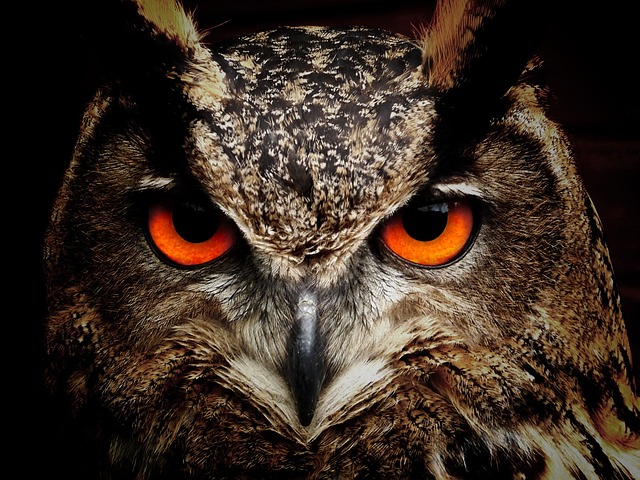Birds are known for their remarkable sensory abilities, including keen eyesight and acute hearing. However, the question of whether birds can sense “bad vibes” or negative energy is a topic of interest. In this introduction, we will explore whether birds possess the ability to detect and respond to negative emotions or environmental cues.
Table of Contents
The Role of Bird Behavior in Detecting Negative Energy
Have you ever noticed how birds seem to have a sixth sense when it comes to detecting negative energy? It’s almost as if they can sense bad vibes in the air. But is there any truth to this perception, or is it just a figment of our imagination? In this article, we will explore the role of bird behavior in detecting negative energy and whether there is any scientific basis to support this idea.
Birds are known for their keen senses and remarkable ability to perceive the world around them. They have excellent eyesight, acute hearing, and a strong sense of smell. These sensory abilities allow them to navigate their environment, find food, and communicate with other birds. But can they also detect negative energy?
Some people believe that birds can sense bad vibes because they have a heightened sensitivity to changes in their surroundings. They argue that birds are highly attuned to their environment and can pick up on subtle cues that humans may not notice. For example, birds may be able to detect changes in electromagnetic fields or variations in air pressure that are associated with negative energy.
In addition to their sensory abilities, birds also have a remarkable ability to read body language and facial expressions. They can pick up on subtle cues in the behavior of other animals, including humans, and use this information to assess potential threats or dangers. This ability to read body language may explain why birds seem to be able to sense bad vibes. They may be picking up on subtle cues in our behavior that indicate negative emotions or intentions.
Furthermore, birds are highly social creatures that live in flocks or communities. They rely on each other for protection, finding food, and raising their young. As a result, they have evolved to be highly attuned to the emotions and intentions of their fellow flock members. This heightened sensitivity to the emotional state of others may also extend to humans, allowing birds to detect negative energy.
While there is no scientific evidence to definitively prove that birds can sense bad vibes, there are some studies that suggest they may have this ability. For example, a study conducted by researchers at the University of Cambridge found that birds were able to detect changes in human facial expressions and respond accordingly. This suggests that birds may be able to pick up on subtle cues in our behavior that indicate negative emotions.
In conclusion, while there is no concrete scientific evidence to support the idea that birds can sense bad vibes, there are some indications that they may have this ability. Birds are highly attuned to their environment and have remarkable sensory abilities that allow them to perceive subtle changes in their surroundings. They also have a keen ability to read body language and facial expressions, which may enable them to detect negative energy. Whether or not birds can truly sense bad vibes remains a mystery, but it is certainly an intriguing possibility. So, the next time you notice a bird acting strangely, it might just be picking up on something that you can’t see or feel.
How Birds’ Senses Help Them Perceive Negative Vibes

Have you ever wondered if birds have a sixth sense that allows them to pick up on negative vibes? It may seem like a far-fetched idea, but the truth is that birds have incredibly sharp senses that help them perceive their surroundings in ways we can only imagine. From their keen eyesight to their acute hearing, birds have evolved to be highly attuned to their environment. In this article, we will explore how birds’ senses play a role in their ability to sense bad vibes.
Let’s start with their eyesight. Birds have exceptional vision, with some species being able to see a wider range of colors than humans. This heightened visual perception allows them to detect subtle changes in their surroundings, including the body language and facial expressions of other animals, including humans. It’s no wonder that birds are often depicted as being able to sense danger or negative energy.
In addition to their keen eyesight, birds also have a remarkable sense of hearing. They can detect a wide range of sounds, including high-frequency sounds that are beyond the range of human hearing. This acute hearing allows them to pick up on subtle cues in their environment, such as the rustling of leaves or the faint sound of footsteps. It’s possible that birds can pick up on the vibrations caused by negative emotions, such as fear or anger, and respond accordingly.
Another sense that birds rely on is their sense of smell. While not as developed as their vision or hearing, birds still have the ability to detect certain scents. Some studies have suggested that birds can detect chemical signals in the air that are associated with fear or stress. This could explain why birds sometimes seem to be able to sense when something is not quite right.
It’s important to note that while birds may have heightened senses, they are not psychic. They cannot read minds or predict the future. However, their ability to perceive subtle changes in their environment allows them to react quickly to potential threats or dangers. This is a survival mechanism that has been honed over millions of years of evolution.
So, the next time you feel like you’re giving off bad vibes, don’t be surprised if a nearby bird seems to take notice. Birds have an incredible ability to perceive their surroundings, and their senses play a crucial role in their survival. While we may never fully understand the extent of their abilities, it’s clear that birds have a unique perspective on the world around them.
In conclusion, birds’ senses are finely tuned to their environment, allowing them to perceive subtle changes and potential threats. While they may not have a sixth sense for bad vibes specifically, their heightened vision, acute hearing, and limited sense of smell enable them to pick up on cues that humans may miss. So, the next time you encounter a bird that seems to be paying extra attention to you, remember that they are simply using their incredible senses to navigate their world.
The Connection Between Bird Communication and Sensing Bad Vibes
Have you ever noticed how birds seem to have a sixth sense when it comes to detecting danger? It’s almost as if they can sense bad vibes in the air. But is there any truth to this notion, or is it just a figment of our imagination? Let’s explore the fascinating connection between bird communication and their ability to sense bad vibes.
Birds are highly social creatures, and they rely on effective communication to navigate their environment and ensure their survival. They use a variety of vocalizations, body language, and even visual displays to convey messages to one another. But their communication goes beyond just conveying information; it also serves as a way to detect potential threats.
One way birds communicate is through alarm calls. These calls are distinct from their regular vocalizations and are used to alert others in the flock of potential danger. When a bird senses something amiss, it emits a high-pitched, repetitive call that acts as a warning signal. This alarm call not only alerts other birds in the vicinity but also serves as a deterrent to potential predators.
But how do birds know when to sound the alarm? It turns out that they are incredibly perceptive when it comes to reading the emotions of their fellow flock members. Birds can pick up on subtle cues such as changes in body language, vocalizations, and even the release of stress hormones. These cues help them gauge the emotional state of their flock mates and determine if there is a potential threat lurking nearby.
In addition to detecting danger within their own flock, birds can also sense bad vibes from other species. For example, some birds have been observed reacting to the presence of predators that are not a direct threat to them. They can pick up on the fear or distress signals emitted by other animals and respond accordingly. This ability to sense bad vibes from different species allows birds to stay one step ahead of potential danger.
But how do birds actually sense these bad vibes? It is believed that they have a heightened sense of perception, particularly when it comes to detecting changes in the environment. Birds have excellent vision and can see a wide range of colors, including ultraviolet light, which is invisible to humans. This enhanced visual acuity allows them to pick up on subtle changes in their surroundings, such as the movement of a predator or the body language of their flock mates.
Furthermore, birds have an acute sense of hearing. They can detect sounds at a much higher frequency than humans, allowing them to pick up on subtle vocalizations and even the beating of wings from a distance. This keen sense of hearing helps them detect potential threats and respond accordingly.
In conclusion, birds have a remarkable ability to sense bad vibes and detect potential danger in their environment. Through their intricate communication system, they can pick up on subtle cues and changes in the emotions of their flock mates. This heightened sense of perception, coupled with their excellent vision and hearing, allows them to stay one step ahead of potential threats. So, the next time you see a bird acting strangely, pay attention – it might just be sensing bad vibes in the air.
Exploring the Scientific Evidence of Birds’ Ability to Sense Negative Energy
Have you ever wondered if birds have the ability to sense negative energy? It may sound like something out of a fantasy novel, but there is actually scientific evidence to suggest that birds can indeed pick up on bad vibes. In this article, we will explore the fascinating world of avian perception and delve into the research that supports this intriguing idea.
To understand how birds might sense negative energy, we first need to look at their remarkable sensory abilities. Birds have highly developed senses, including excellent vision, acute hearing, and a keen sense of smell. These sensory capabilities allow them to navigate their environment, find food, and communicate with other birds. But could they also be attuned to the emotional states of those around them?
One study conducted by researchers at the University of Cambridge sought to answer this question. The scientists exposed zebra finches to different types of music, ranging from classical to heavy metal. They found that when the birds were exposed to music with a negative emotional valence, such as heavy metal, they exhibited signs of stress and agitation. On the other hand, when they were exposed to music with a positive emotional valence, such as classical music, they appeared more relaxed and content.
This study suggests that birds are indeed capable of perceiving and responding to emotional cues in their environment. It is believed that birds may have evolved this ability as a survival mechanism. By being able to detect negative emotions in their surroundings, they can potentially avoid dangerous situations or predators.
Another interesting piece of evidence comes from a study conducted by researchers at the University of Vienna. They found that European starlings, a highly social bird species, were able to recognize and respond to the emotional expressions of other birds. When shown images of other starlings displaying either positive or negative expressions, the birds reacted differently depending on the emotional valence of the image. This suggests that birds not only have the ability to sense negative energy but also to empathize with the emotions of their fellow avian companions.
While these studies provide compelling evidence for birds’ ability to sense negative energy, it is important to note that more research is needed to fully understand the extent of this phenomenon. Scientists are still exploring the mechanisms behind this ability and whether it extends beyond just perceiving emotions in other birds.
So, the next time you’re feeling down and encounter a bird, pay attention to its behavior. You might just find that it seems to sense your negative energy and responds accordingly. Whether it’s avoiding you or chirping cheerfully, birds may have a unique ability to pick up on the vibes we emit.
In conclusion, the scientific evidence suggests that birds do have the ability to sense negative energy. Through their highly developed senses and social interactions, they can perceive and respond to emotional cues in their environment. While more research is needed to fully understand this phenomenon, it is clear that birds possess a remarkable ability to tune into the emotional states of those around them. So, the next time you’re feeling down, take solace in the fact that there may be a feathered friend nearby who understands and empathizes with your bad vibes.
Conclusion
In conclusion, birds do not have the ability to sense or perceive “bad vibes” in the same way humans do. Their behavior is primarily driven by instinct, environmental cues, and social interactions within their own species. While birds may react to certain stimuli or changes in their surroundings, it is not based on a perception of negative energy or emotions.
For licensing reasons, we must provide the following notice: This content was created in part with the help of an AI.


